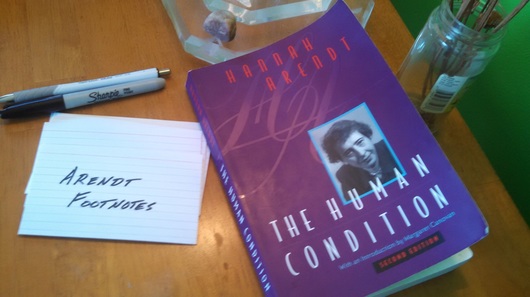 Arendt Footnotes #5, Boundary Onslaughts
Arendt Footnotes #5, Boundary Onslaughts Boundary Onslaughts
Arendt notes Montesquieu’s unique definition of laws: rapports subsisting between different beings. This is a stepping-stone footnote; it furthers a discussion of government before the onslaught of human affairs.
The Human Condition
Section 26: The Frailty of Human Affairs
(Page 190-1, bold added)
Action, moreover, no matter what its specific content, always establishes relationships and therefore has an inherent tendency to force open all limitations and cut across all boundaries. (footnote 17) Limitations and boundaries exist within the realm of human affairs, but they never offer a framework that can reliably withstand the onslaught with which each new generation must insert itself. The frailty of human institutions and laws and, generally, of all matters pertaining to men’s living together, arises from the human condition of natality [birth rate] and is quite independent of the frailty of human nature.
17. It is interesting to note that Montesquieu, whose concern was not with laws but with the actions their spirit would inspire, defines laws as rapports subsisting between different beings (Espirit des lois, Book I, ch. 1; cf. Book XXVI, ch.1). This definition is surprising because laws had always been defined in terms of boundaries and limitations. The reason for it is that Montesquieu was less interested in what he called the “nature of government” – whether it was a republic or a monarchy, for instance – than in its “principle … by which it is made to act, … the human passions which set it in motion” (Book III, ch. 1).
The Man burns in 4 days.
Next Up: Arendt Footnotes #6, The Greek Solution: The Daimon, Saturday 5 September.
Posted by Bryan W. Brickner
 RSS Feed
RSS Feed
